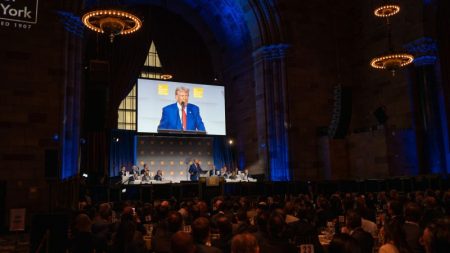Unlock the Editor’s Digest for free
Roula Khalaf, Editor of the FT, selects her favourite stories in this weekly newsletter.
India’s Prime Minister Narendra Modi is set to win a historic third term in office after a partial vote count published on Tuesday showed his Bharatiya Janata party and its partners on course to win re-election, albeit with a smaller majority than before.
As of late Tuesday morning, the BJP and its National Democratic Alliance allies were ahead in at least 293 of 543 seats in India’s lower house, allowing it to secure a third five-year term and form the next government. Early trends showed the opposition INDIA alliance, led by the Indian National Congress, performing better than expected and winning 229 seats.
Exit polls released over the weekend after the end of voting had projected the ruling alliance to win between 353 and 401 seats. During the campaign, Modi and the BJP predicted the NDA would win as many as 400 seats.
If confirmed, the victory would make Modi India’s first prime minister to serve three consecutive terms since independence leader Jawaharlal Nehru and empower him to continue his project of reshaping politics, the economy and society in the world’s most populous country.
However, a smaller majority would make the powerful Indian leader more beholden to his smaller allies in the NDA than before.
The benchmark Nifty 50 stock index shed 5 per cent on Tuesday, driven lower by a sell-off in companies related to infrastructure, a critical policy initiative under the BJP. India’s stock market had hit a record on Monday after weekend polling indicated Modi would win comfortably.
Shares of Adani Ports, Adani Enterprises and Oil and Natural Gas Corporation led losses, dropping 15 per cent, 14.5 per cent and 10 per cent, respectively.
Final results are expected late on Tuesday evening or Wednesday morning. Results were the culmination of a staggered six-week polling process that began in April.
Voting in India is held in phases due to the logistical and security challenges in a country of more than 1.4bn people. The Election Commission of India said 642mn of nearly 1bn registered voters cast their ballots.
During his decade in office, Modi, 73, has fused a powerful combination of Hindu religious nationalism and pro-business policies with welfare schemes benefiting hundreds of millions of low-income Indians while building a cult of personality around his image.
Modi has said he wants to grow India’s economy from the world’s fifth largest to third and lift the country to developed status by 2047, its centenary of independence.
The country has boasted one of the world’s fastest-growing economies since the end of the Covid-19 pandemic, but job creation has failed to keep pace with new entrants to the workforce.
Additional reporting by William Sandlund in Hong Kong
Read the full article here



